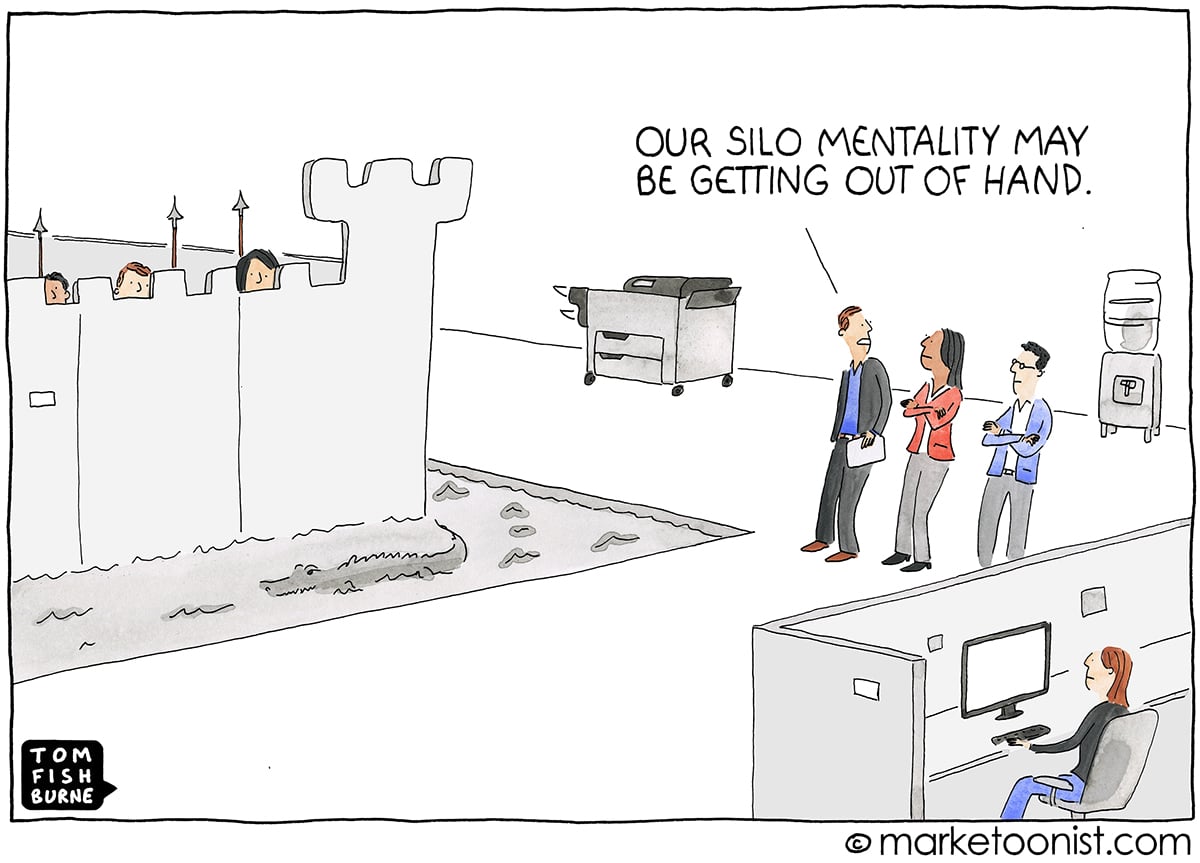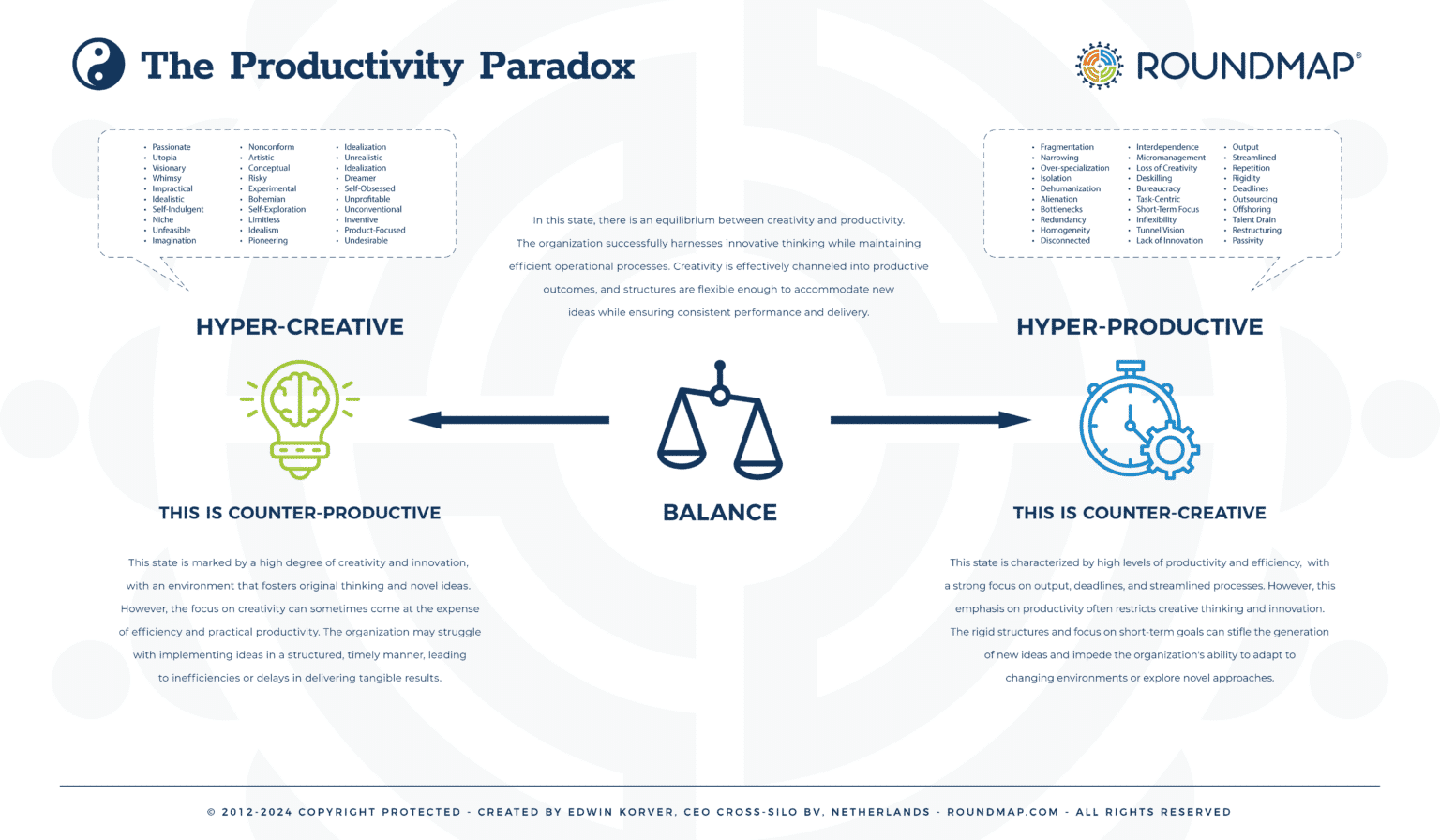Could it be that in our relentless quest for optimization, efficiency, profit maximization, specialization, and subsequent siloization, we inadvertently crafted the most ‘counter-creative’ environment imaginable?
Intriguingly, when taken to extremes, this scenario reveals a paradox where ‘counter-creativity’ equates to mere productivity, while counter-productivity unexpectedly becomes synonymous with creativity.
This counterintuitive dynamic prompts us to reexamine our organizational structures and values – are we unknowingly hindering our potential for innovation and adaptability?
Wastelands of Innovation: Where Silos Meet and Specialists Falter
Research shows that true innovation often sprouts not within the well-defined confines of silos but in the neglected ‘wasteland’ that lies between them. In these interstitial spaces, often overlooked and undervalued, the specialists and the rigid boundaries of their specialization become counter-productive. Straying from their comfort zones and expertise, specialists find themselves in uncharted territories where the conventional tools and approaches no longer apply.
Here, in these fertile grounds for innovation, the ability to think beyond the silo, to integrate and connect disparate fields of knowledge, becomes crucial. This revelation begs the question: how can organizations reshape their thinking and structures to nurture and capitalize on these ‘wastelands of innovation’?
Embracing the Polymath Advantage: Transforming Innovation Wastelands into Hubs of Creativity
One compelling solution to harness the potential of these ‘wastelands of innovation’ is to attract and nurture multi-dimensional talent – the polymaths and generalists. In traditional corporate settings, these individuals are often mislabeled as ‘counter-productive’ because their broad, interconnected skill sets and outputs don’t align neatly with conventional performance indicators. However, these polymaths thrive in the ambiguous and uncharted terrains of the innovation wastelands.
Polymaths, with their wide-ranging knowledge and versatile problem-solving abilities, are naturally equipped to navigate the intersections between disparate silos. Their strength lies in their ability to draw connections across various fields, see patterns where others see chaos, and bring holistic perspectives to complex challenges. In environments where specialists may be out of depth, polymaths can act as integrators, bridging gaps and fostering collaborative dialogues that lead to groundbreaking innovations.
Moreover, these generalists bring adaptability and learning agility critical in rapidly changing markets. They are not bound by the limitations of a single discipline, allowing them to respond to new information and shifting paradigms flexibly. In doing so, they can help organizations become more resilient and agile, turning the ‘counter-productive’ spaces between silos into fertile ground for creative and sustainable growth.
Cultivating Innovation Through Diversity: Building Self-Organizing, Consent-Driven Teams
A second, equally transformative solution is fostering diversity of thought by constructing diverse teams. These teams should be part of a larger ‘constellation of teams,’ each operating with a significant degree of self-organization and autonomy while remaining closely aligned with the company’s overarching strategy, vision, mission, purpose, goals, and objectives.
Diversity in this context goes beyond the conventional parameters of race, gender, and cultural background. It encompasses a variety of disciplines, experiences, cognitive styles, and problem-solving approaches. When diverse minds collaborate, they challenge each other’s assumptions, broaden perspectives, and collectively generate more innovative and robust solutions.
The key to success in these constellations of teams is consent-based decision-making, which empowers team members and ensures that diverse viewpoints are heard and integrated. This approach promotes a high level of engagement and ownership among team members, as they are not merely executing top-down directives but actively shaping the direction of their projects.
Furthermore, the self-organizing nature of these teams allows for greater agility and responsiveness. They can adapt quickly to new information and changing circumstances, making the organization more resilient and capable of capitalizing on emerging opportunities. By aligning these dynamic teams with the company’s broader strategic objectives, organizations ensure that the innovative efforts contribute meaningfully to overall success, turning diversity of thought into a powerful engine for sustainable growth and innovation.
Resolving the Innovation Dilemma: Balancing Creativity and Productivity for Sustainable Success
As we navigate the complexities of modern business environments, it becomes increasingly clear that the traditional focus on maximizing output and driving short-term profits has inadvertently created the productivity paradox. This paradox causes an imbalance, tilted heavily toward productivity over creativity, and constrains our capacity for forward-thinking value creation.
However, the solutions to these paradoxes lie within our grasp.
Firstly, by embracing the polymath advantage, we can revitalize the ‘wastelands of innovation’ that exist between silos. With their broad skill sets and holistic perspectives, Polymaths are uniquely positioned to bridge these gaps, fostering an environment where innovative ideas can flourish.
Secondly, forming diverse, self-organizing teams within a consent-driven framework offers a powerful counterbalance. These teams, rich in varied perspectives and cognitive styles, drive innovation through divergent thinking and alignment with the company’s long-term strategic vision.
In conclusion, by recalibrating the balance between creative and productive capabilities, we can transform our organizations into entities that excel in their current operations and are adept at pioneering new paths of value creation. It’s time to shift our focus from mere output to sustainable innovation, turning today’s challenges into tomorrow’s opportunities.

Author
-
Edwin Korver is a polymath celebrated for his mastery of systems thinking and integral philosophy, particularly in intricate business transformations. His company, CROSS/SILO, embodies his unwavering belief in the interdependence of stakeholders and the pivotal role of value creation in fostering growth, complemented by the power of storytelling to convey that value. Edwin pioneered the RoundMap®, an all-encompassing business framework. He envisions a future where business harmonizes profit with compassion, common sense, and EQuitability, a vision he explores further in his forthcoming book, "Leading from the Whole."
View all posts Creator of RoundMap® | CEO, CROSS-SILO.COM






